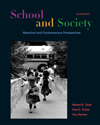Understanding the burdens students walk into school with is an unfortunate but necessary component of teaching today. There are many sites with information on the effects of race, gender, ethnicity and social class on schooling. One theory which makes a lot of sense is the result of sociologist William Julius Wilson's research on work–specifically, the lack of work in inner cities, and the effect on communities and the people who live in them. He believes that the loss of jobs in inner cities has devastated what used to be vibrant communities where children had role models and a vision for the future. You can read an interview with Wilson, as well as an excerpt from his book When Work Disappears, on the sites below. Jonathan Kozol is a fierce champion for children and their educational opportunities. His 1992 book Savage Inequalities vividly illustrates the consequences of the lack of funding for inner city schools, compared to those schools that are handsomely supported by property taxes and more affluent families. Below find links to a Kozol interview, as well as a response to his book. As you read, think about the arguments both men present. If they are compelling to you as a person and as a teacher, why do you think so little has been done about the issues they raise and the solutions they suggest? | 


 2002 McGraw-Hill Higher Education
2002 McGraw-Hill Higher Education